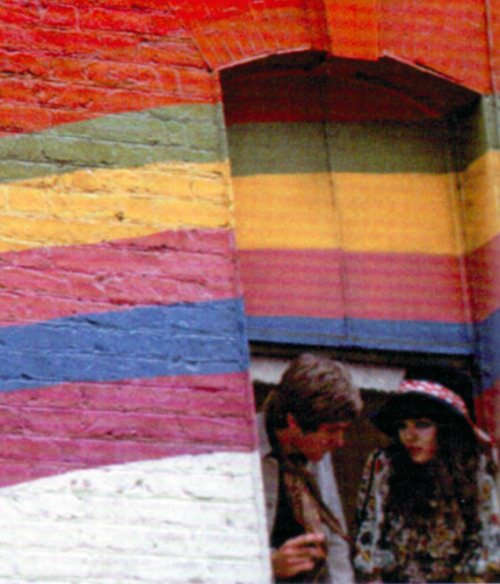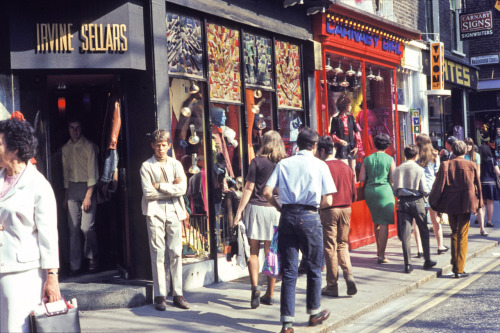In the mid-1960's , after John Stephen's success, Carnaby Street became a gold mine for fashion retailers. For a few years in the late 1960's, the combination of Carnaby Street address and colourful clothes became almost a guarantee of instant, but short term success. Stephen's clothes were and remained well-made. His imitators realized this to be unnecessary - George Melly wrote - It didn't matter how quickly everything fell to bits. The clothes weren't meant to last, but to dazzle. Their shops, blaring pop music and vying with each other for a campest window and decor, spread the length of Carnaby Street and its environs (George Melly, Revolt Into Style, p 151). Among those competitors,only two men managed to come to a financial success comparable to John Stephen's. These men were Warren Gold, who ran Lord John, and Irvine Sellars who ran Mates boutique.
Shoppers at Lord John, 1966.
Lord John was started by brothers Warren and David Gold who opened two boutiques on Carnaby Street in 1964 after a successful period of selling suede jackets from their stall on Petticoat Lane. Aping John Stephen, Lord John specialized in Mod look. Warren Gold made sure that his designs were always up to date, and followed the trends, which, as far as male Mod look was concerned , were changing on almost weekly basis in the mid-1960's. This strategy proved an instant success, and soon Gold brothers were seen around London
driving Rolls-Royces. Warren Gold liked his gangster-like image. Nik Cohn wrote about him: When I interviewed him, Gold wore a see-through bodyshirt over a golden-tanned spare tyre and was not communicative: 'Let's make this fast , young man - I've got a very busy day' (Nik Cohn, Today There Are No Gentlemen, p 115).
Warren Gold, 1969
In 1967 Gold brothers commissioned decorators Binder, Edwards & Vaughan to paint the exterior of Lord John's branch on the corner of Carnaby Street and Ganton Street with a psychedelic mural, making it probably the most eye-catching building on the street. This, combined with the skillful advertising campaign in the press, only added to the success of Lord John. By 1970, Gold brothers owned eight boutiques, and expanded it to thirty during early seventies.
Psychedelic mural by Binder, Edwards & Vaughan
Newspaper ad for Lord John from around 1966.
Jackets from Lord John from early 1970's (found on E-bay).
Coat from Lord John from 1968 displayed in Victoria and Albert Museum.
Cat Stevens outside Lord John, 1966
The Yardbirds at Lord John, 1966
Mickey Dolenz from The Monkees being fitted by Warren Gold himself, 1967
Fashion spread in Fab 208 magazine featuring Lord John coat, 1967
Lord John shopfront circa 1969
Outside Lord John, 1969 (courtesy of John Hellier)
Irvine Sellars was a founder of Mates - one of the first chains of unisexual boutiques in London.
Mates, 1967
Just like Warren Gold, he started his career in fashion from a stall in East End. Observing the beginnings of Carnaby Street, he had noticed that more and more often boys accompanied girls on the shopping trips (and vice versa). He decided to start a boutique that would sell clothes for both sexes. His designs , just like those of Warren Gold's, were initially aimed at Mod youth - and just like Warren Gold , he did not quite achieve John Stephen's originality. Nevertheless, he was making money, and by 1969 (at the age of 32), he owned a chain of 24 boutiques. Nik Cohn wrote about Sellars: He had his own factory in Neasden, and a house in Brighton, and a very large flat overlooking Marble Arch, impersonal and full of antiques which he paid a friend to choose for him. 'This is one of the biggest flats in London, and I can prove that', he said. 'It has ten rooms, three bathrooms and the furnishings are worth a fortune.'
Irvine Sellars, 1970.
He was not villainous. It would be pleasant to depict the Carnaby Street operators as bloodsuckers, ruthless exploiters, milking innocent kids of their very last dime; but Sellars wasn't like that. 'I'm in business', he said, 'and when you're in business, your personal tastes come second to your profits, or they should do. People try to get at me but I'm not a monster, I'm a human being, like everyone else (Cohn, p 115).
Mates on Carnaby Street , circa 1967
Warren Gold and Irvine Sellars were typical entrepreneurs that had overtaken Carnaby Street after 1966 - businessmen first, designers second. They do not have the same significance for fashion history as John Stephen (who, as elsewhere in this blog was said, is himself very underrated), but, just like him ,they became rich. And when the sixties ended ,their boutiques were on the 'way out' - just like John Stephen's. Both Gold and and Sellars ended up selling their businesses, once they stopped being profitable. Warren Gold remained in the clothing business - he came back to Petticoat Lane, where in the Big Red Building he opened Goldrange - a clothing factory outlet store, which he owns to this day.
Sellars (These days known as Sellar - he seems to have dropped 's' from his surname) went into property business, which made him one of the richest people in Britain. Today, he is one of the main investors behind The Shard - the new tallest skyscraper in London.























You might have seen this already but incase not thought I'd share the link!
ReplyDeletehttp://www.howtobearetronaut.com/2011/10/modern-man-carnaby-st-menswear-mail-order-catalogue-1967/
Visited Carnaby Street this Summer, pity the shops there now are so generic. Would love to have been there in '67.
ReplyDeleteDon't we all?...
ReplyDelete43 years after the Warren Gold baldy picture was taken, he now has a splendid shaggy perm syrup!
ReplyDeleteI bought this beloved coat at Lord John in 1967 and will try to have the boutique's name added to the image decription.
ReplyDeleteGteetings!
Lars Jacob
http://commons.wikimedia.org/wiki/File:Mia_Adolphson_%26_LJ.jpg?uselang=sv
https://www.youtube.com/watch?v=syUf5tnHq2s&list=UUWsRMRHtFUkgI5dhke0Lxig
ReplyDeleteMusic Clip (Nino Bravo) in front of Lord John:
ReplyDeletehttps://www.youtube.com/watch?v=syUf5tnHq2s&list=UUWsRMRHtFUkgI5dhke0Lxig